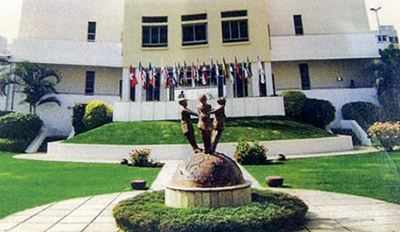- News
- Education News
- News
- IB school says it does not come under Right to Education Act
Trending
This story is from August 26, 2016
IB school says it does not come under Right to Education Act
Pune's first International Baccalaureate (IB) school told Bombay high court on Thursday that it was not a “school“, it had no links to the Indian educational system and thus it did not come under the ambit of the Right to Education (RTE) Act.

MBIB was set up in Pune in 1998 and has 280 students aged 6 to 18 years.
MUMBAI: Pune's first International Baccalaureate (IB) school told Bombay high court on Thursday that it was not a “school“, it had no links to the Indian educational system and thus it did not come under the ambit of the Right to Education (RTE) Act.
The assertion led to a bench headed by Chief Justice Manjula Chellur to ask who the school was then answerable to and “how does it help the Indian economy“.
Mercedes-Benz International School, through senior counsel Milind Sathe, said RTE applied only to elementary education in “recognised schools“. Under RTE, every school has to admit 25% students from local areas at low fees. “But this is a standalone academy recognised by the IB Organisation in Switzerland. The school gives a disclaimer that it is not recognised or affiliated to any board or university in India and hence cannot be subject to RTE,“ Sathe argued. Granting of recognition by the state authorities makes all students in such schools eligible for transfers and cross-admissions to other schools and for admission to higher education.
Sathe said the school in Pune had its own curriculum and syllabus, and over 60% of its students were children of expats and the other 40% were locals who wished to go abroad for further studies. “This is globalisation,“ said Sathe, when Chief Justice Chellur asked how a Swiss academy was setting up school “on our land, using our resources."
The high court bench, including Justice M S Sonak, asked the state government and the Centre to file their replies within two weeks on why an IB school should not be under RTE. The petition was filed through advocate Kiran Bapat in 2015 but was heard for the first time on Thursday .
Lawyer Manisha Jagtap, representing the Centre, said there were eight to 10 IB schools in the state and they might seek similar relief. Sathe said there are “only three pure IB schools in the country . The rest are hybrid schools which opt for IB later and they are recognised also as a school with the state or central board. This is the basic difference“.
The Chief Justice asked the state to inform them how the RTE Act is applicable while remarking that “otherwise, everyone in order to get out of the purview of RTE may set up a school...“
The assertion led to a bench headed by Chief Justice Manjula Chellur to ask who the school was then answerable to and “how does it help the Indian economy“.
Mercedes-Benz International School, through senior counsel Milind Sathe, said RTE applied only to elementary education in “recognised schools“. Under RTE, every school has to admit 25% students from local areas at low fees. “But this is a standalone academy recognised by the IB Organisation in Switzerland. The school gives a disclaimer that it is not recognised or affiliated to any board or university in India and hence cannot be subject to RTE,“ Sathe argued. Granting of recognition by the state authorities makes all students in such schools eligible for transfers and cross-admissions to other schools and for admission to higher education.
Sathe said the school in Pune had its own curriculum and syllabus, and over 60% of its students were children of expats and the other 40% were locals who wished to go abroad for further studies. “This is globalisation,“ said Sathe, when Chief Justice Chellur asked how a Swiss academy was setting up school “on our land, using our resources."
The school run by Mercedes-Benz Education Academy was established in 1998 and has 280 students studying across primary, medium and diploma sections from ages 6 to 18. In conventional schools, it would be the equivalent to standards one to 12.
The high court bench, including Justice M S Sonak, asked the state government and the Centre to file their replies within two weeks on why an IB school should not be under RTE. The petition was filed through advocate Kiran Bapat in 2015 but was heard for the first time on Thursday .
Lawyer Manisha Jagtap, representing the Centre, said there were eight to 10 IB schools in the state and they might seek similar relief. Sathe said there are “only three pure IB schools in the country . The rest are hybrid schools which opt for IB later and they are recognised also as a school with the state or central board. This is the basic difference“.
The Chief Justice asked the state to inform them how the RTE Act is applicable while remarking that “otherwise, everyone in order to get out of the purview of RTE may set up a school...“
End of Article
FOLLOW US ON SOCIAL MEDIA











